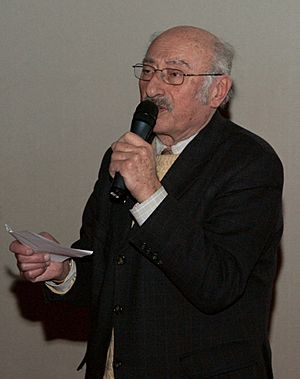Henri Kichka facts for kids
Quick facts for kids
Henri Kichka
|
|
|---|---|

Henri Kichka in 2010.
|
|
| Born | 14 April 1926 |
| Died | 25 April 2020 (aged 94) Brussels, Belgium
|
| Nationality | Belgian |
| Known for | Holocaust education |
| Spouse(s) |
Lucia Świerczyński
(m. 1949; died 2001) |
| Children | 4; including Michel |
Henri Kichka (born April 14, 1926 – died April 25, 2020) was a Belgian writer. He was also a Holocaust survivor. Henri Kichka became a very important person in teaching about the Holocaust in Belgium.
He was the only person in his family to survive the terrible events of the Holocaust. During this time, many Jewish people from Belgium were sent to camps in Central and Eastern Europe. Henri Kichka started sharing his story in the 1980s. He wanted people to remember those who died because of the Nazis. He often spoke to students in schools about what he went through. In 2005, he wrote a book about his life called Une adolescence perdue dans la nuit des camps. His son, Michel Kichka, is a well-known cartoonist.
Contents
Henri Kichka's Life Story
His Early Life and the Holocaust
Henri Kichka was born in Brussels, Belgium, on April 14, 1926. His family was Jewish and had moved from Poland. His father, Josek Kichka, was born in Poland in 1898. He left Poland in 1918 because of growing hatred towards Jewish people. He then moved to Belgium.
Henri's mother, Chana Gruszka, was born in 1899 and came to Belgium in 1924. Both of Henri's parents gave up their Polish nationality in Belgium. This meant they became stateless, without a country to call their own. Henri was the oldest of their three children.
In 1935, his family moved to a part of Brussels called Saint-Gilles. They became somewhat involved with the local synagogue, a Jewish place of worship. At school, Henri learned French, Yiddish, and German. He was not allowed to learn Polish.
The War Begins
In May 1940, Belgium was invaded. It was then placed under German military control. Henri's family tried to escape the invasion. They were part of a large group of people fleeing, called the exode. They ended up in France, in a city called Toulouse.
They stayed for a short time in Revel. Later, the French authorities, known as Vichy France, forced them into a refugee camp in Agde. They moved to several different camps before finally being released to Paris.
Family Separated
On August 1, 1942, Henri's sister, Bertha, received an order. She was told to go to the Mechelen transit camp for forced labor in Eastern Europe. The family went with her to the train station. It was the last time they ever saw her. Bertha Kichka was killed when she arrived at Auschwitz concentration camp in August 1942.
The rest of Henri's family was sent away on September 12, 1942. Henri and his father were made to work on a railroad. His mother, aunt, and other sister were killed at Auschwitz on September 14, 1942.
Henri and Josek, his father, were moved from one camp to another in Germany. They were forced to work very hard. In the last weeks of the war, they were forced to join a death march. This was a brutal march to other camps like Gross-Rosen and Buchenwald concentration camp.
Liberation and Recovery
Henri was freed on April 30, 1945. Sadly, his father, Josek, had died at Buchenwald just a few days earlier. Josek had needed a foot amputated, but did not survive.
After being freed, Henri was sent to an airport in Weimar. He stayed there for 17 days. Then, a truck took him back to Belgium. He weighed only 39 kilograms (about 86 pounds). He stayed at a special center in Uccle, Brussels. Doctors found he had tuberculosis, a serious lung disease. He spent 16 months recovering at Brugmann Hospital in Alsemberg.
On August 30, 1946, he moved to an orphanage. He was the only child there who had survived the concentration camps. The other children had been hidden children, meaning they were hidden from the Nazis. Later, Henri rented an apartment with his friend, Beno Linzer. He started working with leather. In 1947, he joined a Jewish youth sports group.
On April 9, 1949, Henri Kichka married Lucia Świerczyński. He became a Belgian citizen in 1952. He later wrote that his teenage years were "lost" because of his time in the concentration camps.
Teaching About the Holocaust
Henri Kichka did not talk about his terrible experiences until the 1980s. He then began to speak widely in schools. He also took part in school trips to Auschwitz. Teaching young people about the Holocaust became his main purpose in life. He published his memoir, or life story, in 2005.
Henri Kichka passed away on April 25, 2020, in Brussels. He was 94 years old, having died eleven days after his birthday. He died from COVID-19 during the COVID-19 pandemic.
See also
 In Spanish: Henri Kichka para niños
In Spanish: Henri Kichka para niños
- Paul Sobol (1926–2020), another Belgian Holocaust survivor who also taught about the Holocaust.
 | Delilah Pierce |
 | Gordon Parks |
 | Augusta Savage |
 | Charles Ethan Porter |

